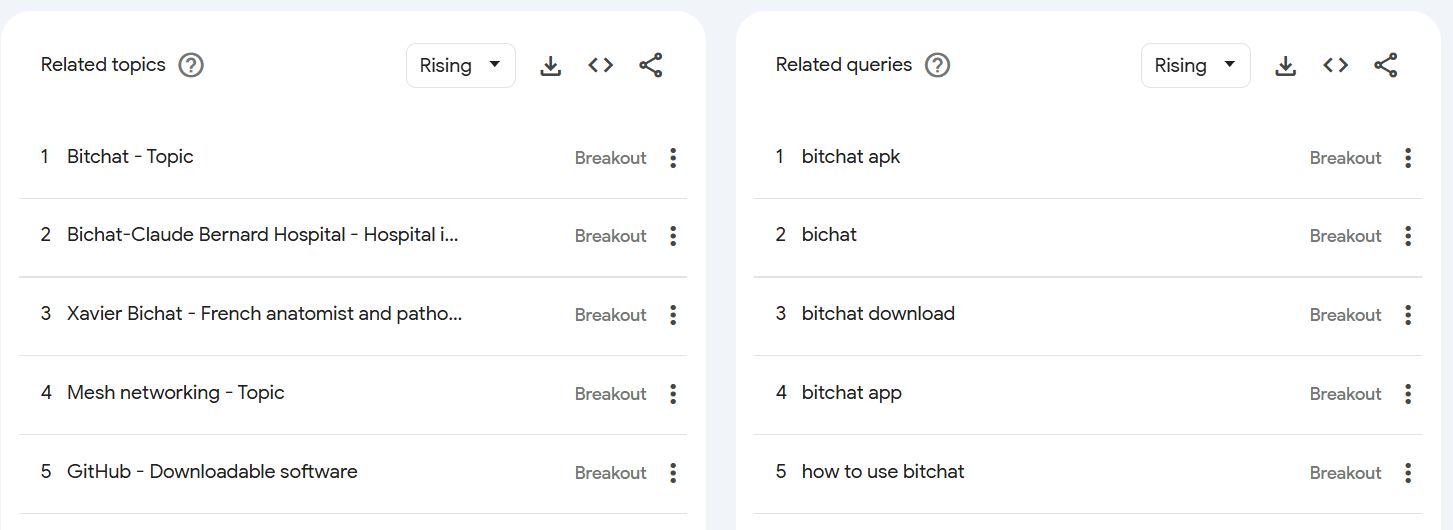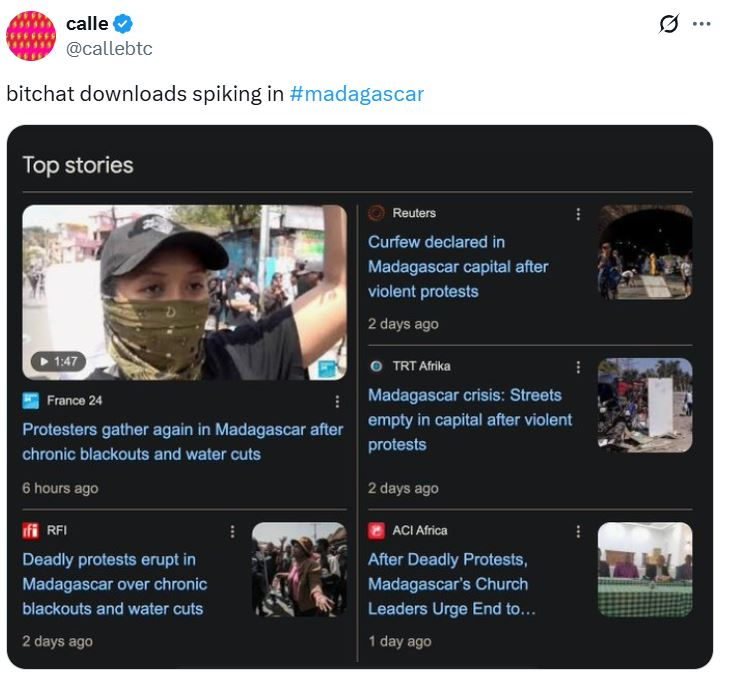Protests in Madagascar Spark Sharp Rise in Bitchat App Usage
Block CEO Jack Dorsey’s decentralized peer-to-peer messaging service Bitchat has seen a spike in downloads from the African island nation of Madagascar amid protests, following a similar uptick during unrest in Nepal and Indonesia earlier in September.
A Bitcoin open-source developer under the X handle callebtc, who is working on the messaging service, said on Sunday, “Bitchat downloads spiking in Madagascar,” along with screenshots of the protest’s news coverage.
“Bitchat” trending in Google searches
Callebtc Bitcoin didn’t share specific download numbers, but Google Trends search for “Bitchat” shows a spike from 0 to 100 on Friday (over 90 days) in Madagascar, especially Antananarivo.
Google Trends tracks how popular a search term is over a specific period of time, with 100 being the highest, and showing “peak popularity,” and 0 showing low interest, or “not enough data.”
At the same time, phrases as “Bitchat download” and “how to use Bitchat” were among the top five related queries, and tagged as “breakout topics,” which means they had a “tremendous increase” in activity, according to Google.

Chrome-Stats show Bitchat has been downloaded 365,307 times since its launch, with over 21,000 coming in the last day and more than 71,000 in the last week. However, it doesn’t specify which regions were responsible for the bulk of downloads.
Protests over power and water cuts
Protests erupted in Madagascar’s capital, Antananarivo, on Thursday, with some demonstrators clashing with police and reports of looting over ongoing water and power cuts, resulting in the energy minister being sacked.
Authorities in Madagascar also imposed a dusk-to-dawn curfew to stifle further unrest. More demonstrations were held on Friday and Saturday across the country.
It comes only weeks after a spike in Bitchat downloads in Nepal amid a series of violent protests over corruption, which resulted in a short-lived social media ban and protestors forced to search for other ways to communicate and coordinate. Indonesia also had a similar uptick in downloads after corruption-related protests erupted.

Most of Madagascar’s population doesn’t have access to the internet
Madagascar is one of the poorest countries in the world. Out of a population of just under 32 million, the global technology data platform DataReportal estimates that there were only 6.6 million people in Madagascar who had access to the internet at the start of 2025.
The platform also estimates there were over 18 million mobile connections active in the country in early 2025 and noted that “some of these connections may only include services such as voice and SMS, and some may not include access to the internet.”
Related: Decentralized social media app to challenge Big Tech’s ‘walled gardens’
Dorsey launched a beta for Bitchat in July. It uses Bluetooth mesh networks for internet-free, encrypted communication, and according to the white paper, the network is fully decentralized with no central servers, accounts, email addresses, phone numbers to register, or infrastructure dependencies.
Encrypted messaging services face Chat Control law in EU
The European Union is in the process of cracking down on private messaging services. Lawmakers are trying to pass a “Chat Control” law, which would undermine encrypted messaging, requiring services such as Telegram, WhatsApp and Signal to allow regulators to screen messages before they are encrypted and sent.
There are 15 EU countries supporting the proposal, but it falls short of the 65% population threshold required for passage. Germany, which holds the pivotal vote, has yet to take a final stance.
Crypto advocates Diode CEO Hans Rempel and Brickken’s Elisenda Fabrega predict the proposal may drive users toward decentralized Web3 platforms designed for privacy by default.
Magazine: ‘Help! My robot vac is stealing my Bitcoin’: When smart devices attack


